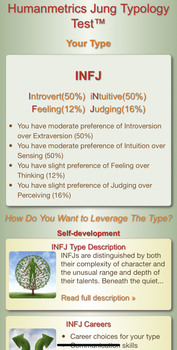My Personality Max Report
Legit INTP
Legit INTP
our Personality Type
Your personality type is INTP. This is based on your four Preferences: Introversion (I), Intuition (N), Thinking (T) and Perceiving (P).
Many of today's theories of psychological typology are based on the work of Swiss psychiatrist Carl Gustav Jung, who wrote Psychological Types in 1921. He was the founder of analytical psychology, which studies the motivations underlying human behavior.
Your personality type is a detailed classification of the innate characteristics that make you who you are. Each of the four temperaments can be divided into four types, making a total of 16 distinct personality types. As with Temperament, your type is determined by the strength of your preferences.
No personality type is better than another. Each person has a unique set of equally valuable characteristics. Understanding your type can be useful in many ways, including relationships and school or career.
INTP - The "Engineer"
INTPs are easygoing yet private. They are logical and enjoy analyzing complex problems. They thrive on the theoretical and like to figure out how things work. They do not like rigid rules and often do not abide by them. They are independent intellectuals.
"Try not to become a man of success, but rather try to become a man of value." — Albert Einstein
INTPs direct their energy inward. They are energized by spending time alone. They are private and typically not socially inclined. Engineers are Intuitive. They are focused on the future and see endless possibilities. They are inventive, imaginative and complex. Their thought process is theoretical and abstract.
INTPs are Thinkers that make decisions with their head. They are impersonal, objective and logical. INTPs are carefree and spontaneous. They dislikes routine and rules. Engineers like to keep their options open. Their style is relaxed and flexible.
Engineers are acutely autonomous. They do not like feeling controlled. Traditional roles often seem debilitating since their focus is always on their intellectual pursuits. They respect people who are genuine. They are willing to sacrifice and are supportive in relationships they care about as long as their independence is respected. Relationships are on their radar but are not always of first importance.
INTPs are complex in their thinking and can produce a great number of ideas. They work well alone and are not always able or willing to communicate their complex thoughts to others. In the workplace they value honesty and integrity. They are impatient with redundancy and sloppy thinking. Intellectual honesty is highly prized by Engineers. If their job is not challenging intellectually, they can become disinterested and perform poorly.
Engineers love to learn. Although they enjoy networking and sharing ideas and knowledge they prefer solitude. They become bored unless the learning experience demands intellectual competence and mastery. They strive for flawlessness and conceptual perfection.
INTPs are highly intellectual people that are driven toward self-mastery and competency. INTPs are their own harshest critics. Their greatest contribution is the design of sophisticated models and theories that improve the lives of others.
Characteristic of an INTP
Typical Strengths
- Logical
- Intellectual
- Easygoing
- Individualistic
- Theoretical
- Flexible
- Inventive
- Curious
- Impersonal
- Objective
- Analytical
- Complex
- Spontaneous
- Private
- Independent
- Future Focused
- Rule breaking
- Carefree
- Creative
- Perfectionist
- Unemotional
- Abstract
Possible Weaknesses
- Laid back and easygoing
- Handles criticism well
- Not demanding
- Enthusiastic about their interests
- Imaginative and creative
- Not good at managing money
- Can be explosive
- Not good at communicating feelings
- Distrusting of others
Your Cognitive Functions
- INTPs make up 2.5% of all 16 personality types. INTPs are one of the most rare personality types. Introversion, iNtuition and Perceiving are less common as dominant preferences than their opposites.
- 1 in every 25 males is an INTP (4% of all males). 1 in every 100 females is an INTP (1% of all females). Female INTPs are the third least common type-gender combination.
- There are significantly more male INTPs than there are female INTPs, with males outnumbering females 4 to 1. One reason there are more male INTPs is that males tend to be Thinkers (T) while females are more often Feelers (F).
You engage the world through four cognitive functions. Each function is directed outward toward people and surroundings (Extraverted) or inward toward your thoughts (Introverted). Your primary function is Introverted Thinking and secondary is Extraverted Intuition.
Introverted Thinking (Primary Function)
You use this function most often. While Thinking (T), you make decisions based on logic and reason. The Introverted Thinking function enables you to categorize and analyze information that you receive. It is the ability to identify inconsistencies and know how things work as well the ability to solve problems.
Extraverted Intuition (Secondary Function)
Your use of this function is somewhat high. With Intuition (N), you process new information through impressions, possibilities and meanings. Extraverted Intuition is what allows you to see different paths or ways. When you receive information, you are able to see that there is more than one way to look at things.
Introverted Sensing (Tertiary Function)
You use this function but to a lesser degree. Through Sensing (S), you process data with your five senses. The Introverted Sensing function allows you to remember data in detail and to compare it with current information. It is the ability to link present experiences to past experiences in search for a connection.
Extraverted Feeling (Least Function)
You use this function least of the four. When Feeling (F), you make decisions based on feelings. The Extraverted Feeling function allows you to tune your behavior to the needs of others. Is it the ability to relate and the desire to connect with others with warmth and consideration as well as draw others out and responds to expressed or unexpressed needs.






























